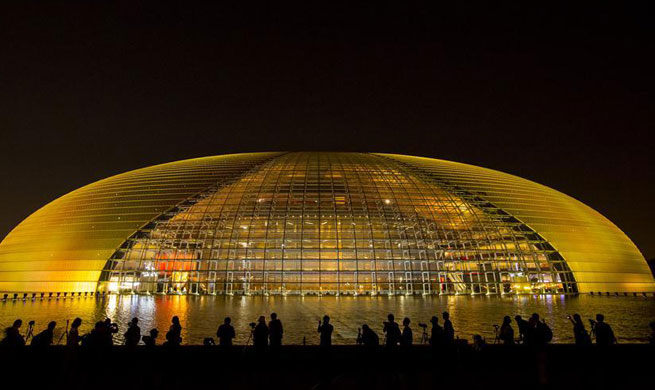FUZHOU, May 12 (Xinhua) -- Serving kung fu tea and speaking a south Fujian dialect, Guo Jingzhuan, 52, a ship owner from Shiyu village in east China's Fujian Province, is proud of his seafaring ancestry.
Almost all the residents in his village are descended from Arabian merchants, who travelled to Quanzhou hundreds of years ago, when the city was one of the world's most vibrant ports. Guo is planning to buy another 10,000-tonne freighter later this year to join what he calls the "100,000 tonnes shipping club."
Quanzhou's shipping industry is booming. As one of the original starting points of the ancient maritime shipping routes, it wants to become an important point along the 21st Century Maritime Silk Road.
SEA WATER IN BLOOD
Located at the estuary of Quanzhou Bay, Shiyu is next to the historical Shihu port, also known as Lin Luan wharf, after the voyager who built it in the eighth century.
Abandoned many years ago, the historic wharf was the first in Quanzhou to accommodate foreign trade ships. Pointing at two islets in the distance and the 800-year-old Liusheng Tower on a nearby hill, Guo Zhimeng, the village Communist Party chief, proudly explained how they have served as navigational marks for centuries.
The ancient maritime Silk Route was a crucial network for trade and cultural exchanges between China's coastal regions and countries in Southeast Asia, Africa and Europe.
According to Ding Yuling, curator of Quanzhou Maritime Museum, a large number of Arabian and Persian merchants sailed to Quanzhou via the route in the eighth century.
During its heyday from the 11th through the 14th centuries, the city grew into the largest settlement of Arabians and Persians in Far East. Some of them stayed permanently, married local Chinese, and integrated into the community. Most of the residents of Shiyu are descended from these seafarers.
"My family has been in the shipping business for centuries; there must be sea water in my blood," said Guo Jingzhuan.
His great-grandfather spent most of his life at sea, and as a child Guo heard about his ancestor's many adventures including being raided by pirates in the late Qing Dynasty (1644-1911), and loosing a cargo of tea seed and soil destroyed by Japanese invaders in the 1940s.
Inspired by those stories, Guo Jingzhuan became a sailor at the age of 17 and dreamt of building his own shipping empire. He borrowed money to buy several village-owned boats and start his own shipping company in 1996.
Like their seafaring forefathers, Shiyu residents are born sailors. Eighty percent of the 5,000 villagers are in shipping industry. According to Ding, today some 50,000 Quanzhou residents are descended from Arabian merchants, especially those with the surnames Ding, Guo and Pu.
REVIVE THE ANCIENT PORT
In 1417, Chinese explorer Zheng He stationed his formidable fleet in Quanzhou waiting for wind to begin another expedition. He visited Guo Zhongyuan, a local businessman of Arabian descent for advice.
Some 600 years after the hustle and bustle of Zheng's fleet, the modern port of Quanzhou remains a hive of activity.
Guo Jingzhuan's childhood dream has come true: through 20 years of hard work he has grown his company of small bulk cargo boats.
There are over a dozen shipping companies based in Shiyu, accounting for two thirds of Quanzhou's shipping capacity. The most successful is Quanzhou Ansheng Shipping, owned by brothers Guo Dongze and Guo Dongsheng. The company now ranks the third largest in China and 24th largest worldwide.
The booming shipping industry offers a glimpse of a thriving city endeavoring to revive itself as an internationally important port. The port's annual throughput has surpassed 100 million tonnes for five consecutive years, and it has grown into an important point of transit for ships bound for and coming from Southeast Asia.
On Tomb Sweeping Day, a traditional Chinese festival to pay respect to ancestors, Guo Jingzhuan and other villagers visit the Guo family shrine in nearby Baiqi, where some Arabic inscriptions detailing their family's origins have been preserved.
Apart from these inscriptions there are few cultural traces of the villagers Arabic ancestry which have been replaced over time by regional dialects, and Chinese customs.
"But our seafaring spirit will never change; we are proud of our merchant ancestors," said Guo Jingzhuan.
The next generation is continuing the connection to the seas. Guo Jingzhuan's son is now getting hands on experience on ships and hopes to inherit the family business someday.


















